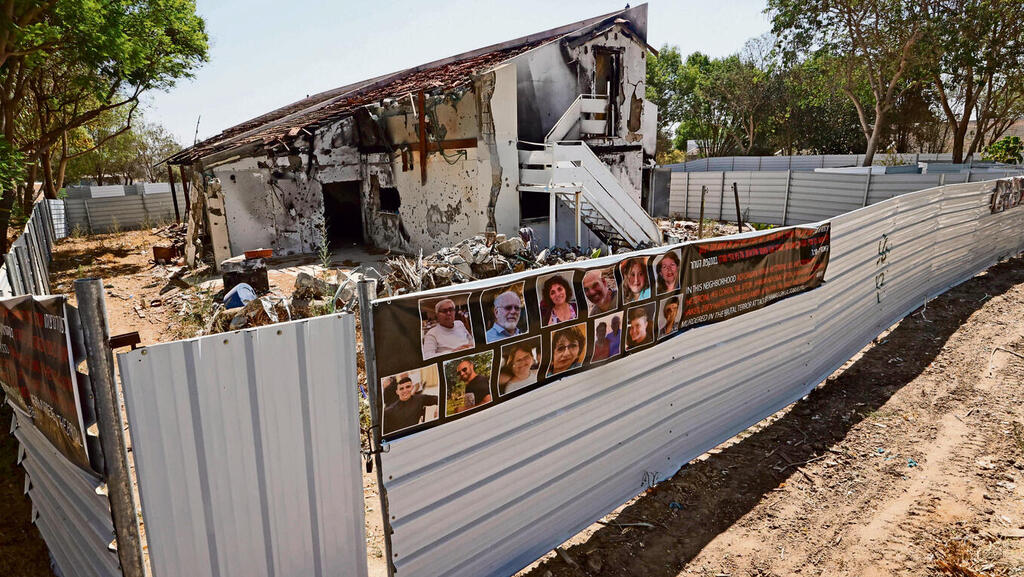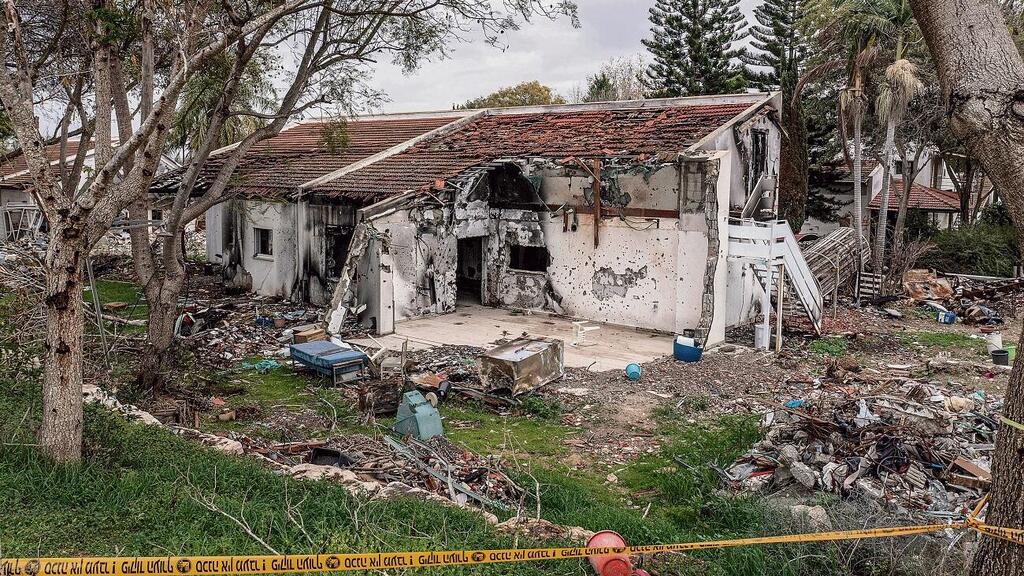Getting your Trinity Audio player ready...
IDF representatives presented on Thursday the findings of the investigation into the events of October 7 in Kibbutz Be'eri to the residents of the kibbutz, at the hotel they were evacuated to in the Dead Sea. The findings of the investigation will later be released to the general public as well, and it is the first of a series of investigations into the battles in the surprise attack by Hamas nine months ago.
The kibbutz members in an official statement said that: "Ithe investigation was thorough, and helped the members of the kibbutz to understand a little the depth and complexity of the fighting in the various sectors of the kibbutz. We see great importance in accepting the blame and responsibility taken by the IDF for the complete failure to protect us, and in asking for forgiveness for their neglect over so many hours, during which we were under an attack of evil that has no equal."
"We demand the establishment of a state commission of inquiry which will leave no stone unturned, examine the conduct of all the parties and provide us with answers with which it will be possible to begin to recover and draw operative conclusions for the future," the statement also said and clarified that the kibbutz demands this "so that the unimaginable loss we experienced will never be experienced again by any other citizen, so that we can restore our trust in the security forces, so that we can go back to living in Be'eri with a sense of security.
3 View gallery


Outside a destroyed home at Kibbutz Be'eri are the photos of kibbutz members still held hostage in GAza
(Photo: Avi Kabalo)
The statement added: "We note that Kibbutz Be'eri did not need the results of the investigation to feel the failure of the IDF every minute since 6:29 a.m. on that black Saturday. We feel it in the loss of 101 of our friends, our loved ones and our family members, in the 11 of our friends who are still held hostage in Gaza, part of 120 who must return home; We see this in the destruction of the kibbutz and in being refugees in our own country for nine months. The failure of the army was burned into our bodies and hearts nine months ago - the investigation is beginning to provide answers to the depth of the failure, and we hope that the serious conclusions from the investigation will be implemented in the most decisive manner."
The members of Be'eri also pointed out a series of questions that, according to them, the investigation did not answer. "Despite the fact that the investigation was thorough, the members of the kibbutz did not receive satisfactory answers to some critical questions, for example: Why didn't the many military forces who gathered at the gate enter the kibbutz for many hours, when the kibbutz was burning and its residents were crying out for help? What caused the intelligence failure that made the Hamas invasion plan possible, and how was the border fence breached without an immediate response from the IDF? Did the soldiers who came to the kibbutz understand that their most important goal was to protect civilians?
"Kibbutz Be'eri is made up of members who have gone through many different traumas and tragedies, and the members' reactions to the results of the investigation, and in particular those related to Pesvsi's house (which was bombed by the IDF in order to kill terrorists and killed several kibbutz member hostages), are varied accordingly. In general, we appreciate the investigative work of those who admit their failure. In moments like these, the heroism of the security forces and volunteers who fought in Be'eri and came with the goal of saving us stand out more than ever. We thank and cherish them. Our hearts go out to the bereaved families who lost their loved ones in this activity," according to the statement.
"Finally, and most importantly, we demand that the neglect that is happening right now across the border - the abandonment of the hostages to their fate for nine months - be dealt with. The continued failure to this day of not returning them must stop. Kibbutz Be'eri demands the return of all the hostages and to advance a deal immediately which will bring our members home. We need to act now, so that they don't become the subject of another investigative committee in nine months."
'According to the investigation no one is responsible, no one is guilty'
Gadi Yarkoni, head of the Eshkol Regional Council, said in response to the investigation results that were presented: "We greatly appreciate the IDF soldiers who fight fiercely to defend Israel. At the same time, the investigation presented continues the line that dominates Israel: No one is responsible. No one is to blame. This is the biggest disaster in the country's history, and all the political and military leadership is unmoved. For us, this is only a partial investigation since during it there was no dialogue with the council, and therefore it does not reflect a complete picture of the heavy disaster. At this time it is important for us to once again honor the brave fighting of the members of the standby squads, who fought alone bravely for long hours, and some even paid with their lives. Even now, they demand a state commission of inquiry, and hope that the lessons and conclusions will be implemented now."
3 View gallery


Evacuees from Kibbutz Be'eri watch images of the first hostage return at a hotel in the Dead Sea
(Photo: Alex Kolomoisky)
Sharon Sharabi, the brother of Eli and the late Yossi, who were kidnapped from the kibbutz, who participated in Thursday's meeting, said that "the army conducted itself recklessly in the Gaza border communities, and the top command should draw conclusions." He noted that IDF spokesman Daniel Hagari, who was among those who presented the residents with the conclusions, admitted at the beginning of the meeting: "We failed to protect Be'eri."
According to Sharabi, "even in the army they say there was a failure. The army left Be'eri's standby squad alone until massive forces entered the kibbutz, only at 6:00 p.m., 12 hours after the infiltration, until then there were small forces entering. There was a failure here, at my brother's house. People were slaughtered. I hope that the IDF will draw conclusions at the top of the command for the sake of the citizens of Israel, that people who failed at the end of the event will step down."
According to testimony, voices were raised during the discussion, and some residents refused to accept the conclusions - especially those concerning the activation of the Air Force and the delay in the entry of the troops into the kibbutz. "The voices rose a bit in part of the conversation. I left with mediocre feelings. The facts were presented as they were, but they did not talk about the conclusions from the process or about taking personal responsibility," said one of the kibbutz members upon leaving the meeting. Some members of the kibbutz claimed during the presentation of the findings that this was a "coverup."
Another resident said that the IDF "conducted a serious, thorough and in-depth investigation." Another member of the kibbutz, Rami Gold, who fought in the battles on October 7, said before the presentation of the conclusions: "Feelings are not easy at the moment, I heard some of the findings of the investigation three days ago and I was not allowed to speak. These are amounts of military information that are not certain to be relevant for us. The population is frustrated, an entire population is going through a difficult process."
According to Gold: "There are two things, one very negative and one positive: The first is that the army abandoned us and the second is that during the hours when we were alone the army did not come and we did actions that saved human lives. We went out after hours of fighting, we saw that there were forces that did not enter. We did a lot, today I understand how much. I returned to Be'eri six months ago, and I am spreading optimism and we are trying to restore the place. All the people on standby security are back to function in case the worst comes back."
Some of the members of the kibbutz did not have great expectations from the investigation. "A person whose life and the lives of his family and community were neglected, when everything is happening before his eyes, does not need an investigation and documents to get a signed confirmation of this," said one of the residents Wednesday night, even before the findings were presented. According to him, the technical findings, such as when the troops arrived and where the fighting took place and where exactly the members were murdered and the extent of the operational failure are less important to residents, who are well-versed in those details.
What is most important to them is the clarification of the questions that bother them to this day, and they are unable to find an answer for. For example, why did the military forces that arrived at the gate of the kibbutz hesitate to enter, while the residents of the kibbutz were imprisoned in home that were going up in flames and no one was saving them. Why did the officers and soldiers evacuate the wounded and dead bodies of soldiers before rescuing the civilians, including children, from the houses that were surrounded by terrorists?
"In my opinion, what is most important in the investigation are the value questions, that is, what was the perception of the officers and soldiers who arrived at the scene," said the same resident. "Did they understand that the lives of the citizens come first? Was their order of priorities correct? Very doubtful, at least according to what we know and according to what the residents say. There are deeper questions here that concern the education of the officers and soldiers, and to understand this you have to go back to their training in the commanders' and officers' courses in the IDF."
In the massacre on October 7, 101 members of Kibbutz Be'eri were murdered and dozens were kidnapped to the Gaza Strip. The investigation will deal not only with the failure to defend the kibbutz, but also with the incident that has since become controversial in which the commander of Division 99, Lt. Col. Barak Hiram, ordered a tank to fire at the house of Pessi Cohen, where terrorists and hostages were entrenched. Thirteen of the hostages were killed in the incident, and only two survived.
The investigation was conducted by Lt. Col. Mickey Edelstein, and after it was presented at the beginning of the week to IDF Chief of Staff Major General Herzi Halevi, it underwent final summaries over the last few days. The presentation of the findings of the investigations will begin with the main battles fought in the Western Negev on the day the war broke out and, in addition to Be'eri, investigations will also be published on the battles in Nir Oz, Kfar Aza and Sderot.



